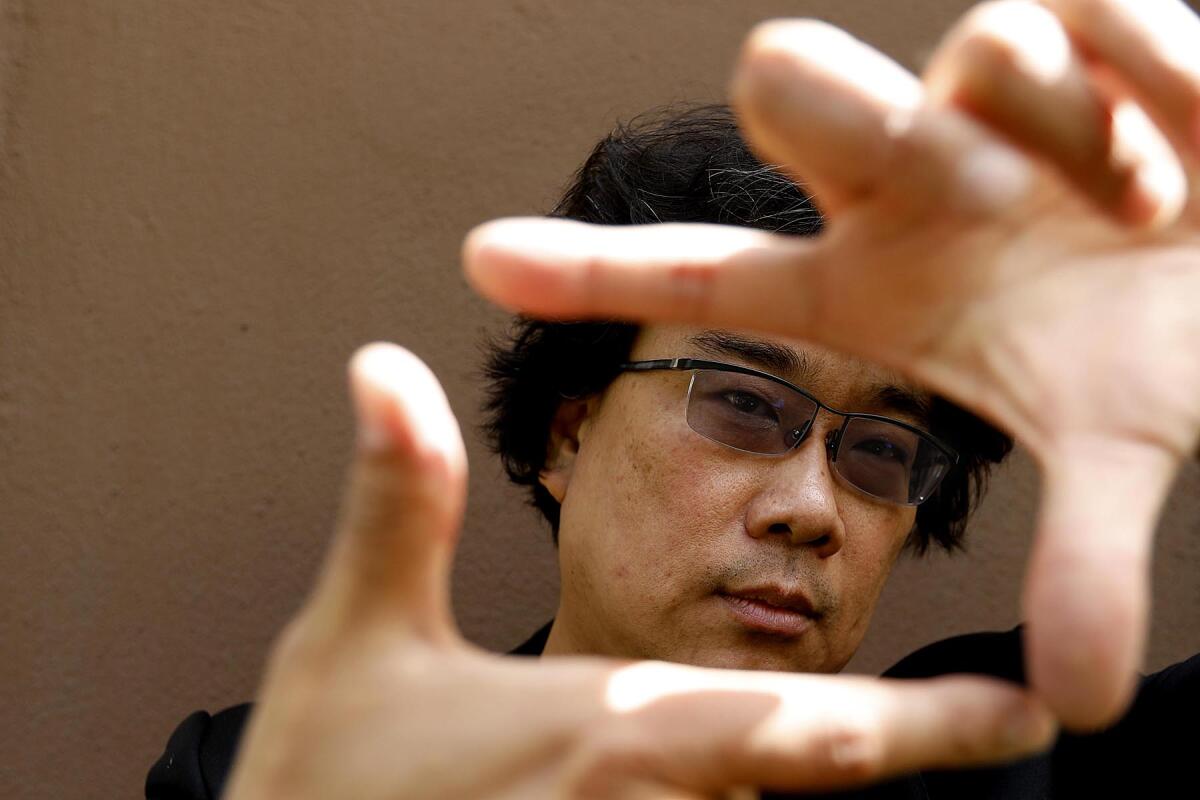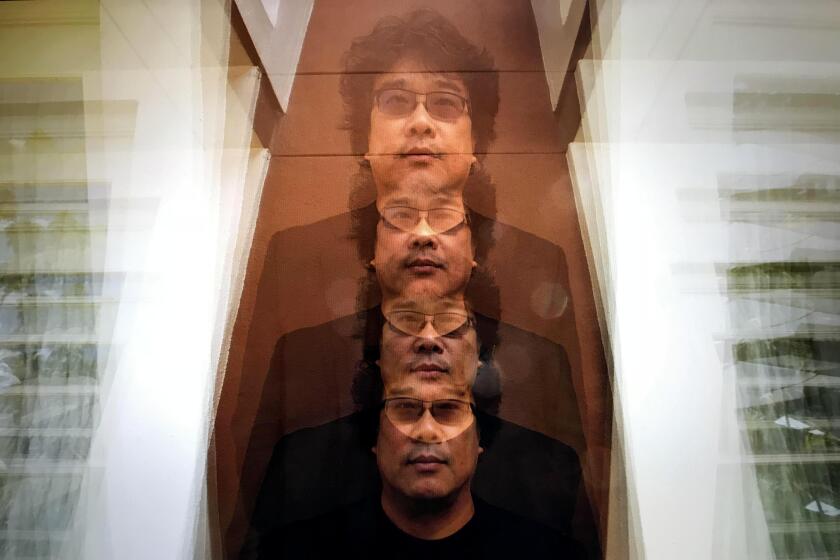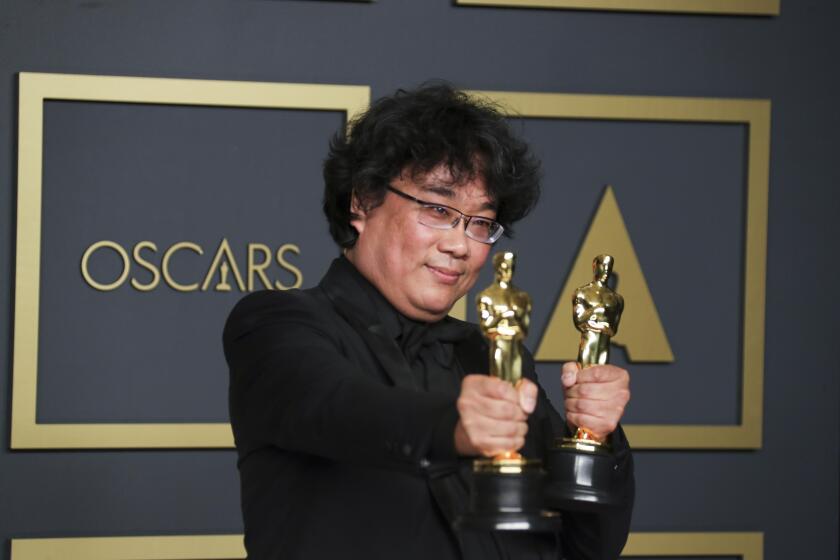Bong Joon Ho’s tips on how he stays so chill: ‘I’m actually very anxious’

- Share via
Korean director Bong Joon Ho’s understated and relatable charm have won him throngs of new admirers during the awards season, especially after his Korean-language thriller “Parasite” picked up four Oscars on Sunday night. There, his meme-friendly reactions and thoughtfulness on stage — and off — propelled him into a mainstream star.
For all his new acolytes out there, here are some ways to live a more Bong Joon Ho life, according to the director himself.
For the record:
5:06 p.m. Feb. 13, 2020An earlier version of this article misattributed a quote in the Guardian to interpreter Sharon Choi. It was said by interpreter Massoumeh Lahidji.
Channel your anxiety into art: For someone who seems so collected when accepting awards or on late-night television, Bong says he’s actually petrified on the inside. “I’m actually very anxious 24 hours a day,” he told Vanity Fair. “A psychiatrist actually told me that I have severe anxiety, and I have severe compulsive tendencies to the point where it would be impossible for me to have a social life. But thanks to filmmaking, I’ve been able to survive.” He’s worked out some anxieties through his work — about income inequality (“Parasite”) factory farming (“Okja”) and police incompetence (“Memories of Murder”). When Bong confronts fear and dread, it strikes a chord with audiences.
‘Parasite’ director Bong Joon Ho on the acclaim, awards and expectations that have people buzzing about his twisty, masterful new thriller.
Maintain a simple lifestyle: Perhaps one reason Bong became such a delight in Hollywood is because he stays so unaffected by the trappings of show business. “I try to maintain a very simple lifestyle,” he told the Telegraph of London. “Drink coffee, write and try not to meet a lot of people.”
And a Vanity Fair cover feature revealed how his publicist insists on keeping him out of photo shoot poses that seem “very Hollywood,” because “he’s so not about that.” The cult of celebrity that’s grown around him seems to just weird him out. His reaction to getting a hero’s welcome at the Incheon International Airport in Seoul after winning the top prize at Cannes last year? “It was very awkward in the airport. Super awkward.”
Eschew categories: He comes from a country that remains divided along the 38th parallel, and his films explore social and economic divisions, the kind of lines that feel impossible to cross. But Bong’s art refuses to fit easily into any boxes, jumping from hilarious hijinks, to tragedy, to thriller, to horror and back. As he’s become an international success story, Bong has consistently downplayed the notion of borders and labels in filmmaking.
“I don’t think it’s necessary to separate all the divisions, whether it’s Europe, Asia or the U.S.,” he said. “If we pursue the beauty of cinema and focus on the individual charms that each piece has, then I think we will naturally overcome all these barriers.”
Maintain a sense of mischief: Bong says his originality comes from being a “weirdo.” But his films and his personal history suggest his weirdness has a distinctively subversive flavor. He was a college activist during South Korea’s successful push for democracy, a formative period for the country and for Bong. In his work, he inserts a healthy amount of absurdist humor through the stories and keeps his toe across the line with visual gags or easy-to-miss political references. “My films generally seem to have three components: fear, anxiety, and a ... sense of humor,” he told New York magazine‘s Vulture website. “At least when we laugh, there’s a feeling that we’re overcoming some kind of horror.”
Look loose while simultaneously sweating the details: He comes off super loose, dropping f-bombs easily and ending his Oscar acceptance speech for directing by saying, “I will drink until morning.” But when it comes to his craft, he’s so detail-oriented that his nickname in his native Korea is “Bong-tail.” He draws by hand all the storyboards to his movies, which end up looking like elaborate graphic novels. He has said that going on set without a storyboard makes him feel like he’s in a train station in his underwear. So having it all drawn out in advance smooths out the filmmaking process — he shoots no extra “coverage” shots when the actors arrive on set. After filming, he relishes being involved in every aspect of post-production, down to the sound-mixing at the very end.
“It’s rare that such an obsessive craftsman can achieve such fleetness and the consistent impression of total ease and even looseness, when in fact there’s nothing remotely loose about what he’s doing,” fellow director and Bong superfan Ari Aster told Vanity Fair.
A historic best director Oscar goes to ‘Parasite’ filmmaker Bong Joon Ho, the first Korean winner and only the second time the prize has gone to a film not in English.
Stay true to yourself and your story: Bong made English-language productions “Snowpiercer” and “Okja” in collaboration with American teams. Yet his winningest and most universally acclaimed film is a full Korean production, set in modern Korea with Korea-specific cultural touchpoints. The lesson, according to Bong, is a liberating paradox — the more personal you get, the more universal the appeal. “Perhaps the deeper I delve into the things that are around me, the broader a story can become,” Bong says. After all, Parasite’s central story about a family progressively embedding itself more deeply into a rich one is borrowed from his own life.

Have a partner on your side who truly sees and hears you: Part of the reason Bong comes off so lovable is because his interpreter, Sharon Choi, 25, takes his Korean quips and artfully — and simultaneously — translates them into conversational English. Case in point? His much-shared quote following his Golden Globes win: “Once you overcome the one-inch tall barrier of subtitles, you will be introduced to so many more amazing films.” Korean speakers know she could have translated that from the original Korean more directly, which would be technically correct but less true to the spirit of what he expressed.
Without this indispensable relationship, the magic of Bong would, well, translate less well to the rest of us. Now, Bong’s trying to reciprocate by supporting Choi. She is a filmmaker too, and Bong announced to the press room at the Oscars, “She’s writing a feature-length script,” like a proud dad. “I’m so curious about it.”
Don’t delay meals: This following is the entirety of Bong’s speech after “Parasite’s” eight-minute standing ovation at Cannes: “Thank you, let’s all go home.” He later said that he kept things hyper-brief because he knew everybody in the cast was starving and impatient to finally eat.
Elise Hu is a correspondent and host at NPR, based in Culver City.
More to Read
Sign up for The Wild
We’ll help you find the best places to hike, bike and run, as well as the perfect silent spots for meditation and yoga.
You may occasionally receive promotional content from the Los Angeles Times.











